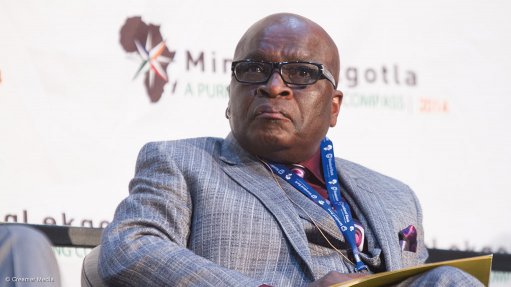
Mineral Resources Minister Ngoako Ramatlhodi
Photo by: Duane Daws
CAPE TOWN (miningweekly.com) – A coal task team has been established to intensify the dialogue between government, business and labour on the mineral, which suffered a R23-billion foreign exchange loss in 2014 owing to falling prices, Mineral Resources Minister Ngoako Ramatlhodi said on Wednesday.
Speaking at the IHS Energy South African Coal Exports Conference 2015 attended by Mining Weekly Online, Ramatlhodi said that steps were also being taken to consider ways of changing the shift systems worked by mineworkers in order to minimise job loss and maximise output through the inclusion of Sundays as working days.
The Minister, who won applause after displaying a preparedness to take ongoing questions from the floor, said that the coal task team had convened for the first time last week so that difficulties could be anticipated before they arose.
"My approach is to tell the Ministry to be hands on," the Minister, who was appointed last May, said in response to Mining Weekly Online.
He explained that coal policy centred on creating a balance between the exportation of coal, which was crucial in keeping mines profitable, and the domestic consumption of coal, which was vital for power generation.
Steps to increase mining productivity through the use of technology were being studied and implemented.
The Minister said that the inflow of R23-billion less foreign exchange into South Africa from 2014 coal exports had resulted from coal's low export price ebb.
He expressed disappointment at coal-mine fatalities rising to nine last year, two more than the year before.
Eskom primary energy divisional executive Vusi Mboweni said the 20% rise of the domestic coal price to Eskom between 2008 and 2013 had put financial pressure on the State utility, which was difficult to relieve in the environment of Eskom’s electricity tariffs being subject to regulatory control but domestic coal prices not being subject to regulation, which made it problematic for the State utility to recover its rising input costs.
If Eskom collapsed, it would hurt South Africa as a whole and it was thus in everyone’s interests for the State power utility to be financially viable.
Ramatlhodi made it clear that the Cabinet had decided to give financial support to Eskom and said that R100-billion investment was needed in both the extraction of 66-billion tonnes of South African coal and multi-purpose logistics infrastructure for the mineral, which provides the fuel for more than 90% of the country's electricity and 30% of its synthetic transport energy.
With the export market depressed, Mboweni said that coal miners currently had a greater appetite to supply the domestic market but the company needed to look long-term in arriving at solutions that went well into the future.
Coal exports and domestic consumption formed a complementary relationship and Eskom would like to see coal-mining companies succeeding in the export markets and simultaneously providing Eskom with their left-over coal at left-over prices.
Currently the State-owned Eskom was also receiving coal from State coal-mining company African Exploration Mining and Finance Corporation to supply a million tonnes of coal a year, up from the current half a million tonnes a year.